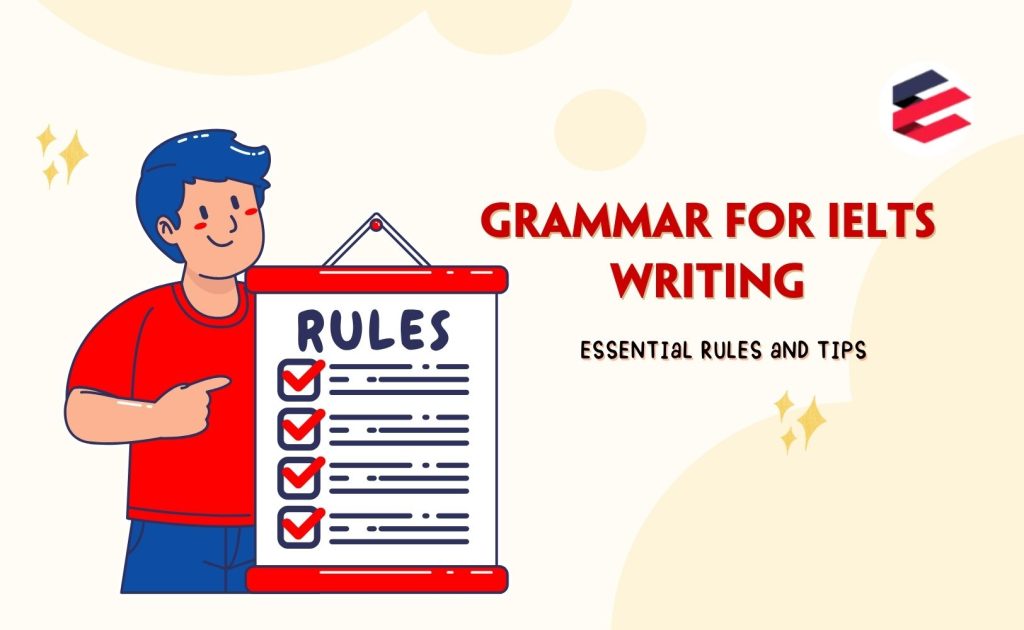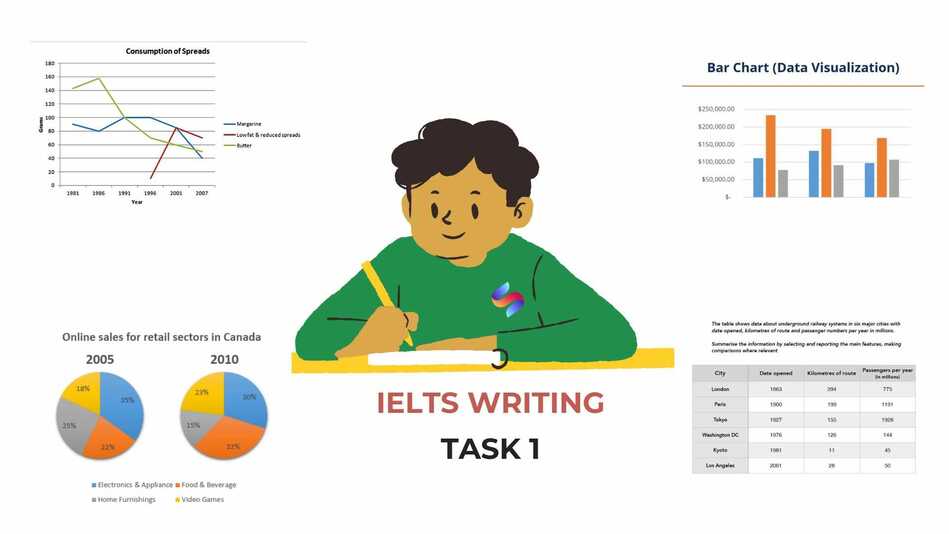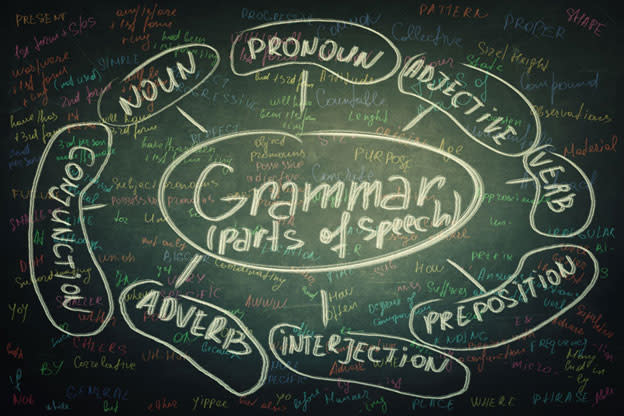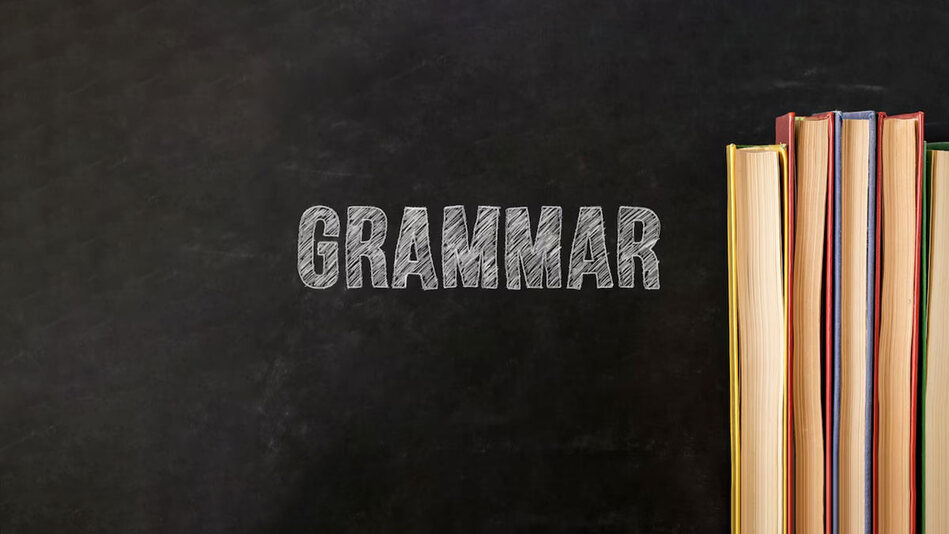Grammar for IELTS Writing: Essential Rules and Tips to Boost Your Score

Why is Grammar for IELTS Writing Important?

The role of grammar for IELTS writing is crucial as it is one of the factors in assessing the language proficiency of test takers. Specifically, in this section, examiners assess candidates’ performance according to four key criteria.
- Task Achievement (Task 1)
This criterion assesses how well you fulfill the requirements of Task 1. It focuses on how accurately you summarize and present the main features of the given data. Strong grammatical skills are essential to describe trends, compare information, and highlight key details clearly and concisely.
- Task Response (Task 2)
In Task 2, examiners evaluate how effectively you address the question and develop your argument. Accurate grammar allows you to express complex ideas, provide supporting evidence, and articulate a clear position. Your ability to use a range of grammatical structures directly impacts your score.
- Coherence and Cohesion
This evaluates how well your writing is organized and how effectively you use linking words and phrases to connect your ideas and sentences, creating a logical and easy-to-follow flow.
- Lexical Resource
This criterion evaluates your range and accuracy of vocabulary, focusing on your ability to use appropriate words and phrases to express your ideas effectively.
- Grammatical Range and Accuracy
This assesses your ability to use a variety of grammatical structures flexibly and accurately, thereby demonstrating your control over grammar and syntax. Any error in grammar for IELTS Writing can lower your final score.
Key Grammar Rules for IELTS Writing
Grammar for IELTS Writing Task 1

For Task 1, the candidate will be provided with visual information such as diagrams, graphs, or processes. Based on these resources, you need to utilize grammar accurately and clearly to describe the given data.
- Verb Tenses: Choose the correct tense based on the time period presented in the data.
Example: The company’s profits increased significantly between 2015 and 2019. (Past simple for completed actions)
- Comparative and Superlative Forms: Use these forms to highlight trends and make comparisons.
Example: The price of oil reached its highest point in the first quarter of 2023. (Superlative)
- Prepositions of Time and Place: Employ prepositions precisely to indicate when and where events occurred.
Example: The GDP will rise dramatically up to $415 billion in 2023. (Prepositions of Time )
- Quantifiers and Percentages: Use quantifiers (e.g., a majority, a significant proportion, a small number) and percentages accurately to describe numerical data.
Example: Approximately 80% of respondents agreed with the proposed changes.
- Passive Voice: Useful for emphasizing the action rather than the actor, particularly when describing processes.
Example: A rising trend can be seen in the number of international students studying in the United States.
- Complex Sentence Structures: Incorporate dependent clauses to provide additional information and enhance sentence variety.
Example: While exports increased by 10%, imports remained stable during this period.
See also: IELTS General Writing Task 1: Overview and tips to get high score
Grammar for IELTS Writing Task 2

Task 2 requires candidates to write a well-structured essay to give opinions on a social issue, which must be of a high standard. This is when grammar for IELTS writing knowledge comes into use so you can deliver your ideas clearly.
- Conditional Sentences: Use conditionals to explore hypothetical scenarios and cause-and-effect relationships.
Example: If the government invested more in renewable energy, we could see a significant drop in air pollution.(Second Conditional)
- Model Verbs: Employ modal verbs to express possibility, obligation, advice, and permission.
Example: Perants should stop their children spending too much time on electronic devices.
- Transition Words and Phrases: Use linking words to create a cohesive and logical flow of ideas.
Example: Despite the rise in urban crime, more people continue to relocate to cities looking for a better life.
- Relative Clauses: Utilize relative clauses to add detail and connect ideas within sentences.
Example: Email and social networking sites such as Facebook and MSN have created online communities that are global in scale.
- Active vs. Passive Voice: Choose the active or passive voice strategically to emphasize different aspects of your argument.
Example: Factories release harmful chemicals into rivers, damaging aquatic ecosystems. (Active voice)
See also: IELTS Writing Task 2: Overview and ways to improve your score
Practical Tips to Improve Grammar for IELTS Writing

- Consistent Practice: It is important to set aside regular time to practice writing essays and reports on a variety of topics to familiarize yourself with the tasks.
- Utilize Grammar Checkers Wisely: Tools like Grammarly can be helpful for identifying errors, but it’s better to rely on your own understanding of grammar rules rather than blindly accepting suggestions.
- Analyze High-Scoring Model Essays: Reviewing high-quality sample IELTS essays can provide valuable insights into how effective use of grammar can successfully convey complex ideas.
- Seek Constructive Feedback: It is recommended to seek the assistance of a qualified educator or an experienced peer to analyze your writing as they can come up with helpful feedback or any grammatical errors.
- Focus on Your Weaknesses: To enhance your writing proficiency, it is advisable to identify and address your most common grammatical errors through targeted exercises aimed at improvement.
Improving your grammar for IELTS writing requires practice, grammar accuracy, and effective strategies. Discover more tips for IELTS writing as well as IELTS online tests to get a higher score with IELTS Test Pro!